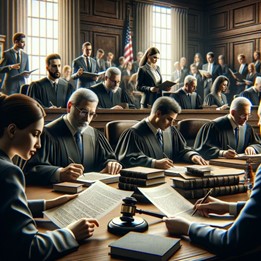An Overview of the Judicial review process
Siddhant Kumar Pandit
Delhi Metropolitan Education
This blog is written by Siddhant Kumar Pandit, a First-Year law student of Delhi Metropolitan Education


INTRODUCTION:
Law plays an important role in today’s society. To deal with people's rights and to protect their rights we have further adopted judicial review. Judicial review is an essential feature of the Indian democracy. In India, there are three main organs of government namely legislature, executive, and judiciary. The legislature performs the function of making the laws and executive implements the law and the judiciary makes sure that the law is being made and implemented. Judiciary review is the power of the judiciary to examine the constitutionally of legislature enactments and executive orders of both the central and the state governments. In the Indian constitution, there are two main courts supreme courts and high courts.
HISTORICAL BACKGROUND:
This concept is adopted by the United States of America. It was summarized in Marbury V. Madison, 1803. In this case, the term period of President Adam belonging to the Federalist Party came to an end and Jefferson the anti-federalist came to power. On his last day, Adam appointed the members of the federal party as judges. But when Jefferson came to power, he was against this. So, he stopped Madison the secretary of state, from sending the appointment letter to the judges. Marbury, one of the judges, approached the Supreme Court and filed a writ of mandamus. The court refused to entertain the plea and first opposed the order of the legislature.
Types:
In India, judiciary review is mainly categorized into three types: - Legislative Action, Administrative Action, and Judiciary Decision.
Legislative review
This review means that whatever law is passed by the legislative it must follow the provision of the constitution. The law that is made by the legislative should not violate the fundamental rights and basic structure of a constitution. It should not disrespect any provision of the constitution.
Administrative review
This review means that the court has the power to review an action of legislature and executive. If their actions are found to violate any of the provisions of the Constitution, then they will be declared void. The court also reviews the decisions and actions of administrative agencies. Therefore, their actions should follow the provisions of the Constitution.
Judiciary Decision
Judiciary Decision means that if lower courts give some decision that is not correct so then higher courts change the decision of higher courts. If the higher court decision is not correct then the apex court (Supreme Court) can change the decision.
Importance of Judiciary review:
The judicial review ensures that the Constitution remains the supreme law of the land and that all laws and actions by the government are in conformity with its provisions. It ensures the fundamentals of citizens. Judicial review is essential for securing the independence of the judiciary. The judicial system maintains the balance between the state and the central. It also protects the rights of the people. It serves as a mechanism for maintaining a system of checks and balances among the three branches of government. This prevents any one branch from becoming too powerful.
Cases:
Key cases of judicial review in India include Kesavananda Bharati v. State of Kerala (1973), which established the Basic Structure Doctrine, and Minerva Mills Ltd. v. Union of India (1980), which reinforced the limits on Parliament's power to amend the Constitution.
· Keshavananda Bharati v. State of Kerala (1973): This case established the doctrine of the basic structure. It limits the amending power of the Parliament and ensures the protection of essential features of the Constitution.
· Maneka Gandhi v. Union of India (1978): The Supreme Court held that the right to personal liberty under Article 21 includes the right to travel abroad. It also expanded the scope of Article 21 to include the principles of natural justice.
· Minerva Mills Ltd. v. Union of India (1980): The Court struck down certain provisions of the 42nd Constitutional Amendment Act. It emphasizes the importance of judicial review in preserving the constitutional balance and preventing excessive legislative encroachment.
Conclusion:
Judicial review is essential for maintaining the integrity of the legal system, upholding constitutional principles, and protecting individual rights. By providing a mechanism for scrutinizing the legality and constitutionality of laws and governmental actions, judicial review ensures that democratic governance remains accountable, fair, and within the bounds of the law.
References:
1. Ipleaders - https://blog.ipleaders.in/limitations-of-judicial-review-in-india/#Designated_only_to_the_Supreme_Court_and_the_high_courts
2. Century Law Firm - https://www.centurylawfirm.in/blog/judicial-review-in-india/
3. LegalServicesIndia-https://www.legalservicesindia.com/law/article/1989/10/Limitation-Of-Judicial-Review
4. Britannica - https://www.britannica.com/topic/judicial-review
Law essential - https://lawessential.com/constitutional-law/f/judicial-review-%E2%80%93-overview-cases-and-limitations
